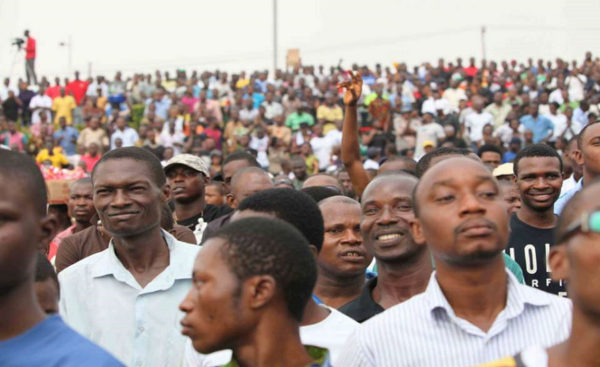BY Muhammadu Buhari, President of Nigeria’s Speech at the 6th EU-Africa summit in Brussels
When it comes to the relationship between the European Union and Africa, unfair arrangements have long been skated over for lack of alternatives.
Increasingly unsustainable, these one-sided deals have provoked calls from both sides of the Mediterranean for a partnership of equals. At the EU-Africa Summit, leaders from across my continent will gather with their European counterparts to transform such rhetoric into substance.
The EU is currently Africa’s largest trading partner, and Africa is the fastest growing continent on earth. While each presents the other with great opportunities, as partners, we also share a host of problems. Today, the EU-Africa relationship must be shifted toward a new economic arrangement in order to address them.
By 2050, Africa’s population of 1.3 billion is set to double, making up a quarter of the world’s total. My country, Nigeria, is set to double its population to 400 million by then, surpassing the United States to become the third largest nation in the world. This means a huge youthful market right on Europe’s doorstep and — with increased trade — a growing middle class with money to spend.
However, despite burgeoning possibility, irregular northward migration from my continent drains Africa’s talent pool, while provoking political crises in the EU. Despite its best efforts, Europe will not find a sustainable remedy to this problem by further reinforcing its Fortress Europe approach. Instead, more opportunities must be created for Africans at home, providing alternatives to the decision to take a life-threatening boat journey in order to seek them elsewhere.
The relationship between the EU and Africa must be rebalanced to power job creation. Unfortunately, today’s arrangements do just the opposite.
Where some claim preferential trade policies with the EU lend a helping hand to Africa, the real picture is far more complicated. The Everything but Arms scheme grants 32 African countries tariff-free access to Europe’s protected markets. In addition to the fact that this excludes many of the continent’s 54 nations, there remain barriers to Europe’s markets even for countries that qualify.
For example, though agricultural subsidies to EU farmers may not be the same as external tariffs, their effects are identical: They make Africa’s exports uncompetitive. More than €50 billion is ploughed into keeping European food produce cheap. With its main export market distorted against them, African countries are deprived of foreign exchange, and investment in agriculture is stifled.
Conversely, Economic Partnership Agreements (EPAs) give Europe deeper access to African markets. At the lower end of the value chain, these free-trade deals ensure EU agricultural subsidies deliver another blow to African farmers, as artificially depreciated produce floods the market, undermining domestic competitors. For instance, subsidy-driven surpluses of European milk are powdered and sent to Africa, decimating its dairy industry. It is a similar story when it comes to wheat and poultry production. Despite having the most underutilized arable land in the world, Africa remains a net food importer. Meanwhile, more than half of Africans work in agriculture, a sector in which sustained improvements offer the fastest path to poverty reduction across the continent.
At the higher end of the value chain, premature trade liberalization demanded by these EPAs have put nascent manufacturers out of business. In other cases, industries simply don’t materialize because there is no incentive to enter the market. Consequently, the jobs required to satisfy millions of young Africans joining the employment market every year are not created.
It is for these reasons that Nigeria decided against signing an EPA. But this was only possible because of our place as the largest economy in Africa. Smaller nations have little choice.
The unease over such deals is not limited to Africans either. Warnings from within the EU, including from development ministers, have stated the deals are irreconcilable with poverty reduction pledges and U.N. Sustainable Development Goals.
When subsidies and EPAs are taken together, the current trade arrangements are a little different from what took place in our past. Africa is supplying natural resources. Yet extractive industries are job-light and sift Africa’s wealth from the continent.
This is not only a matter of rewriting agreements. We must also change the way we interact. In 2019, the African Continental Free Trade Agreement (AfCFTA) came into effect. It created the largest free trade market in the world, and over time it will progressively break down tariffs and non-tariff barriers between nations within the continent.
An inheritance of colonial extraction, trade within the continent currently languishes at 17 percent, compared to Europe’s 68 percent. In fact, Africa trades more with Europe than it does with itself. The free trade area shall rectify this, driving development whilst also diversifying economies.
At the same time, speaking with one voice, Africa can mobilize its collective clout to gain better deals for itself on the world stage. Today we meet as continents, and our trade relations should reflect that. Yet EPAs pitch the EU as one against regional groupings or individual countries in Africa, and the pursuit of these deals has the effect of creating a motley of various conditions and tariff regimes across the continent. Pulling nations in different directions, will slow the implementation of AfCFTA and undermine eventual efforts to attain a customs union.
Moving forward, it is clear what a new economic deal between our unions should entail: For Africa, it must offer a chance for a fundamentally new economic deal. For Europe, it must provide the chance to rid itself of a trade policy that quashes job-creation in Africa and hinders efforts to stem economic migration to Europe.
The way forward is clear, the deal just needs to be struck.













